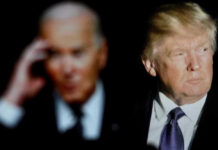
Federal courts just handed conservative patriots and President Donald Trump a major victory, allowing his administration to withhold nearly $9 billion in foreign aid despite lawsuits from left-leaning groups determined to override executive authority.
Story Snapshot
- The federal appeals court ruled that only the Government Accountability Office can challenge executive impoundment of funds, not private organizations.
- This decision cements Trump’s authority to control foreign aid spending and limits activist interference in U.S. fiscal policy.
- The ruling tests the boundaries of the Impoundment Control Act and sets a precedent for future executive-legislative battles over appropriations.
- Critics claim the verdict erodes congressional power, but supporters see it as a win for limited government and accountability.
Appeals Court Upholds Executive Power Over Foreign Aid
A federal appeals court ruled 2-1 that the Trump administration may continue withholding approximately $9 billion in foreign aid, rejecting lawsuits from aid groups and advocacy organizations.
The court determined that only the Government Accountability Office (GAO) has standing to challenge the executive’s actions under the Impoundment Control Act, not private entities.
This decision delivers a strong affirmation of the president’s authority to control foreign aid disbursement, reinforcing the separation of powers and curtailing judicial activism in fiscal policy disputes.
This ruling follows years of tension between Congress and the executive branch. After President Trump began withholding funds in 2019, left-leaning organizations launched multiple lawsuits, arguing that these actions violated both statutory law and constitutional principles.
Congress responded by passing a rescissions package, but did not fully reverse the administration’s policy. The court’s majority opinion, written by Judge Karen Henderson, clarified that only the GAO, as the congressional watchdog, can enforce the ICA in court, while private groups lack standing to sue.
This precedent narrows the scope of judicial intervention and limits activist attempts to dictate federal spending from the bench.
Legal Foundations and Historical Context
The Impoundment Control Act of 1974 was enacted to restrict presidential impoundment of funds after abuses under President Nixon, reinforcing the legislative power of the purse.
Historically, the executive has occasionally withheld funds for policy reasons, sparking regular battles over spending authority. The Trump administration’s decision to reassess foreign aid priorities and delay disbursement was consistent with conservative calls for fiscal responsibility and skepticism regarding overseas expenditures.
Courts have traditionally been hesitant to intervene in such disputes, often citing standing and justiciability concerns. This latest ruling echoes that reluctance, affirming the executive’s right to challenge Congress on appropriations when justified by policy priorities.
Key moments leading to the current decision include the Ukraine aid freeze in 2019, which resulted in a GAO finding of ICA violation but no successful court challenge.
The present case tests the boundaries of the ICA, highlighting the judiciary’s resolve to restrict non-governmental actors from enforcing congressional spending mandates.
In the dissent, Judge Florence Pan argued for more robust judicial intervention to preserve congressional intent. Still, the majority maintained that constitutional claims cannot be manufactured through the separation of powers argument alone.
Stakeholders and Power Dynamics
President Trump, the State Department, and the Office of Management and Budget played pivotal roles in implementing the withholding of foreign aid. Aid groups, reliant on federal funding for humanitarian projects, were the chief plaintiffs in the failed lawsuits.
The GAO’s statutory authority to enforce the ICA places it as the central figure in future legal disputes over appropriations. The appeals court judges—Henderson (majority), Katsas (concurring, Trump appointee), and Pan (dissenting)—embody the ideological divide over executive discretion and legislative oversight.
The ruling reinforces the executive’s leverage in spending battles, further limiting Congress’s enforcement options unless the GAO acts on its behalf.
The executive-legislative struggle over appropriations remains a defining feature of American governance, with the judiciary serving as the ultimate arbiter of statutory and constitutional boundaries.
Congress retains the power to appropriate funds but faces significant hurdles in compelling the executive to comply without court intervention.
As aid groups consider further appeals or legislative remedies, the Trump administration’s approach signals a continued commitment to conservative principles—limited government, fiscal restraint, and skepticism of unchecked spending abroad.
Impact and Expert Perspectives
Short-term effects of the ruling include immediate disruption or cancellation of foreign aid programs, with vulnerable populations in developing countries facing increased hardship.
The decision sets a firm precedent for executive authority over appropriations, restricting the ability of private organizations to challenge presidential discretion in court.
Legal scholars argue that the ruling narrows judicial review in fiscal matters, raising concerns about unchecked executive power. At the same time, policy analysts caution that future presidents may be emboldened to withhold funds for political reasons.
Federal appeals court rules Trump admin can withhold billions in foreign aid https://t.co/vPL0LAT2D0 via @JustTheNews
— † Crusader (@Wil_Johnson1) August 13, 2025
Supporters of the ruling contend it preserves executive flexibility and limits judicial overreach, aligning with conservative priorities for accountable, limited government. Critics warn that it erodes congressional authority and undermines transparency in federal spending.
The broader impact extends to the international development sector, which now faces increased uncertainty over U.S. funding commitments.
The legal community gains clarity on standing requirements, with the judiciary reaffirming its reluctance to wade into appropriations disputes except when government entities bring the challenge.
As the Trump administration continues to pursue reforms grounded in constitutional principles and fiscal restraint, the ruling stands as a significant milestone in the evolving battle over separation of powers.
Sources:
U.S. Court of Appeals, Official Opinion (CourtListener, 2025)
Federal Appeals Court Rules Trump Can Withhold Foreign Aid, New York Times, August 13, 2025.
Trump Signs 2025 Rescissions Bill Into Law, Just The News, 2025.
Impoundment Control Act of 1974, U.S. Code.
The Limits of Judicial Review in Appropriations Law, Harvard Law Review, 2025.
Executive Power and Congressional Appropriations, Brookings Institution, 2025.



















